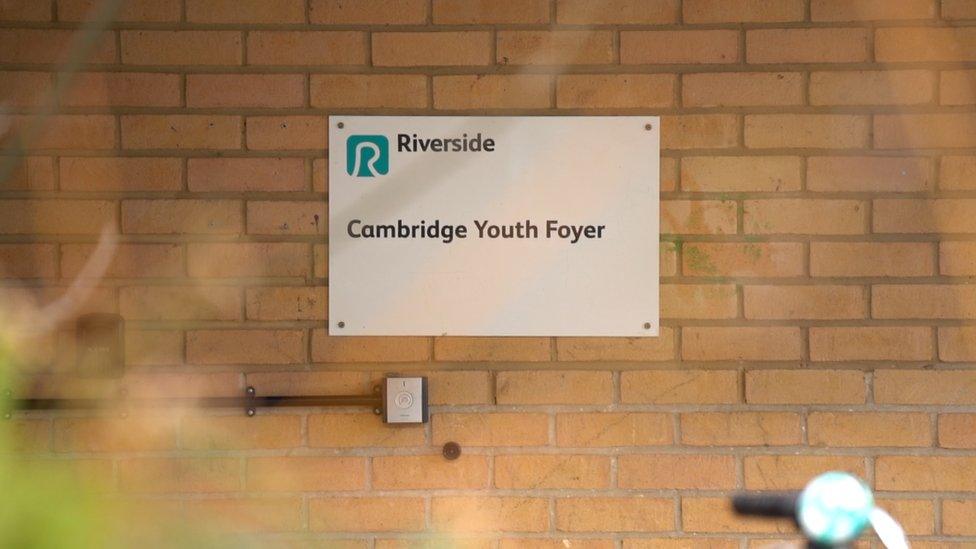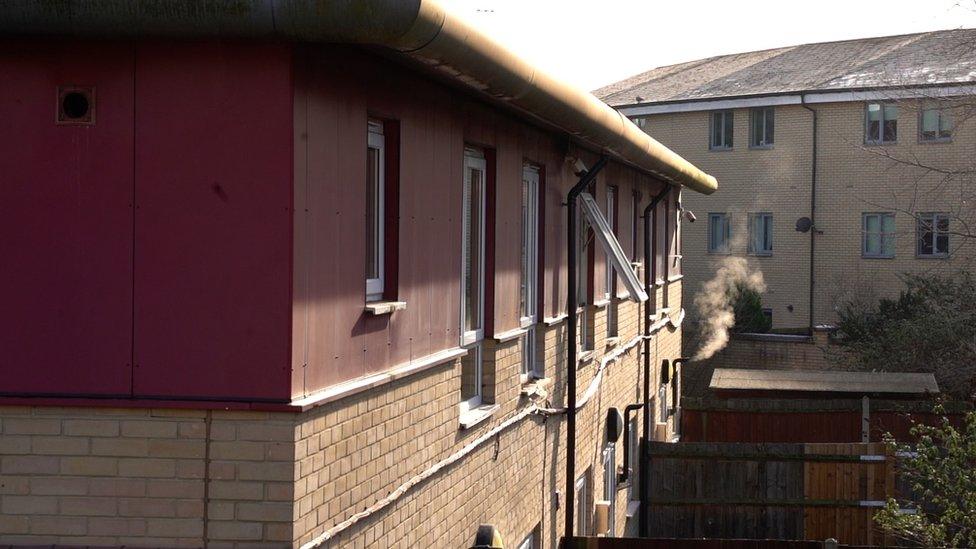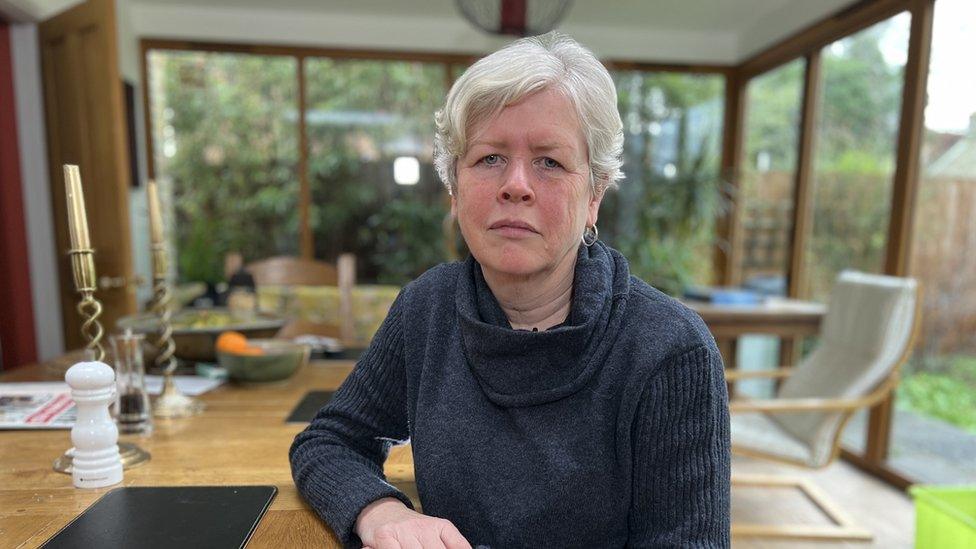Care leaver tells of 'terrifying' time in hostel after leaving foster home
- Published

Ellie lived at the Foyer in Cambridge for just over a year but says she wished she had stayed with her foster family for longer
Each year, thousands of children leave care across the UK. Many, like Ellie (not her real name), move from foster home to a hostel hoping for independence. But having found herself living next to an alcoholic, unwittingly befriending a sex offender whose past was hidden from her and was offered cash to store drugs in her room, it is a decision she now deeply regrets.
As she approached her 18th birthday, Ellie had to decide whether to "stay put" in her foster home or move out.
Keen to begin her adult life, she chose to move out and into a hostel.
In 2021, 10 days before she turned 18, she moved into the Cambridge Youth Foyer, a hostel for 16 to 25-year-olds at risk of homelessness that sits near the city's railway station.
It is a decision she now regrets.
"I hated living there in the end," she says, sitting on the sofa in the comfortable living room of her former foster home.
"It would have been so much easier here. I would've got a life. I would've done work. I would have experience… but I didn't."

Ellie has now moved out of the Foyer and is hoping to build a life away from Cambridge
"The first day I was very excited. It was the first night, really, it was unsettling.
"I hadn't been on my own. I didn't know how to react."
She was not alone for long.
"It was terrifying moving in there," she says, "when you actually saw people around you and saw who you were with.
"I was used to being in a quiet safe house [where] I knew what was around me and what was going on."
The Foyer is run by Riverside, a housing association.
She says she was concerned about the security of her room at the Foyer.
"The noises I could hear and the kicking off around me - I could hear all of that and it was terrifying. I wasn't used to it."

The Foyer is for 16 to 25-year-olds in Cambridge who are at risk of homelessness
She tells how one of her early neighbours, a teenager with alcohol abuse issues, would "always kick off and kick the doors down and he would knock on your door all the time".
"He sat outside my door and drew penises on my door," she says. "He would just always kick off in the night and smash through doors and start screaming."
This, she says, happened "every night, for months" and triggered painful memories from her childhood.
"I hate screaming. I hate fights. When I hear it, I hate it."
He was eventually removed from the Foyer, she says.

After the excitement of gaining some independence, Ellie says she found the hostel "terrifying"
Riverside says the "safety and wellbeing" of its residents is the organisation's "number one priority" and that it takes its "duty of care" to them "extremely seriously".
The association added it had "robust safeguarding policies and procedures in place aimed at protecting our residents" and that anybody referred to its services "undertakes a full assessment of their needs and risks".
John Glenton, the landlord's executive director of care and support, said: "We will only accommodate someone if we are confident that we can meet their needs and we determine they are not a risk to others at the service."
But Ellie believes she should have been warned about another resident, whom she befriended.
He was recently released from prison when they met.
"He had told me originally that he went to prison for stabbings. In our generation, that's quite normal. It shouldn't be, but it is.
"So I wasn't that bothered."
Only later, after becoming close with this fellow resident, did she discover he had convictions for sexual assault.
"I should have been told… they knew how close I was," says Ellie. "They knew he was hanging around in my room, they knew it was just me and him and some other people in that one room.
"Anything could've happened to us and they chose not to tell us.
"We were innocent young girls and he is older than us, he's two years older. They should have protected us but they didn't."
Riverside said that "to respect people's confidentiality" it "would not automatically disclose personal details of residents to others at the service unless it was identified another person was at immediate risk".

Riverside say it is "deeply concerned" about the allegations made about the Foyer
Ellie claims her time at the Foyer also exposed her to the risk of criminal exploitation.
She had a job as a waiter but found that if she earned over a threshold, she lost housing benefit and got into debt with Riverside, which in turn put her at risk of eviction.
"I had no money, I had no benefits, I couldn't pay my rent," she says.
Some of those she came into contact with offered her a way of making extra money.
"I was asked to hold weed (cannabis) - a lot of weed - for one or two days and I was offered £300 for it. And I said 'no'.
"It was tempting - it was the money, I needed the money - but I'd rather not have the money than go to prison.
"I know if I said yes to him, I would have stayed in it, I would have kept doing it.
"You need that money. You're in debt. You can't feed yourself, you can't clothe yourself, you go 'yeah, ok, come on, I can do that'.
"But then, that's it, you're in and then they'll keep asking you and keep asking you and asking your friends around you."
She says hostels and those living in them are preyed upon by drug dealers.
"Drug dealers see hostels as the best opportunity because they don't get searched by police, they don't get touched, you're vulnerable.
"The police don't look at that place, it's secure in drug dealers' eyes."

Ellie worked as a waiter but found if she earned too much her benefits stopped and she risked getting into debt
John Glenton, from Riverside, says they have a "strict no drugs policy on our premises which is firmly enforced and if anyone is found to be dealing drugs they are immediately asked to leave and the police are informed".
"We work closely in partnership with the police. We meet with them regularly, have a formal information sharing agreement in place with them and they have provided bespoke training and advice for staff at the service," he added.
"We are deeply concerned about the allegations that have been made against the Cambridge Youth Foyer, however we can't comment on this particular case as the allegations have been made anonymously so we are unable to investigate and respond to the specific points made."
He urged Ellie to come forward, anonymously if necessary, to Riverside so it can "thoroughly investigate" her allegations.
Earlier in January, Ellie moved out of the Foyer, hoping to begin a new life away from Cambridge.
She is in regular contact with her foster mother Liz Walter, 61, who says she was "completely shocked" after hearing what Ellie had gone through.

Liz Walter was Ellie's foster mother for five years
"I think that a lot of the social workers don't really even know or fully understand what goes on in those hostels. I think a lot of people don't," she said.
"They're just sort of hidden away. We don't hear about these kids.
"They're kind of forgotten kids, so I'd be very reluctant to advise anybody to go into one of them in that situation."
Cambridgeshire County Council, which has a duty of care to foster leavers, said it was "sorry" to hear about Ellie's experiences at the Foyer.
"As Ellie's corporate parent we are disappointed that her experience at the Foyer was not positive and like any parent we remained in touch with Ellie and escalated the concerns that she raised with us to the Foyer as did her former foster carer," the council said.
"We are aware of some, but not all of the concerns expressed by her regarding the difficulties she faced living there."

The authority added that the Foyer "should provide supportive accommodation" for young people but that a new commissioning model aims to move away from "large hostels" and it would prefer to use "smaller units, though "options are limited".
"It is never acceptable that any care leaver should have to go through what Ellie experienced at the Foyer," the council said.
"When it became clear that Ellie was unhappy living at the Foyer, she was encouraged to begin bidding earlier for social housing and was supported by her personal advisor who remained in touch with her as well as having the support of her connected Foster Carer."
Supt Adam Gallop, of Cambridgeshire Constabulary, said that tackling drug dealing and criminal exploitation "is a priority for the force".
"Premises where young people are placed can be vulnerable to exploitation and we are closely linked into support and safeguarding services across every level, with specialist officers available to investigate and respond to any concerns," he said.
Illustration by: Darren Stolady

Find BBC News: East of England on Facebook, external, Instagram, external and Twitter, external. If you have a story suggestion email eastofenglandnews@bbc.co.uk, external